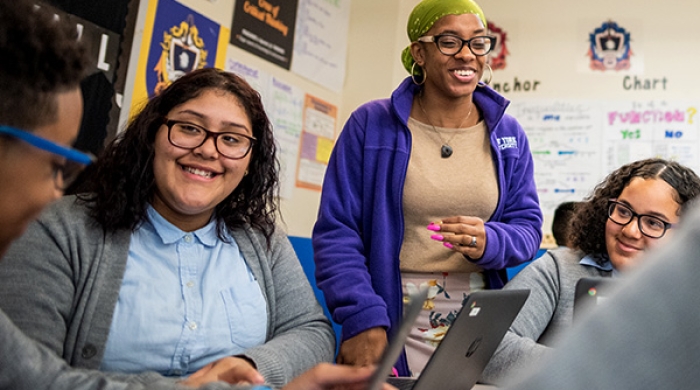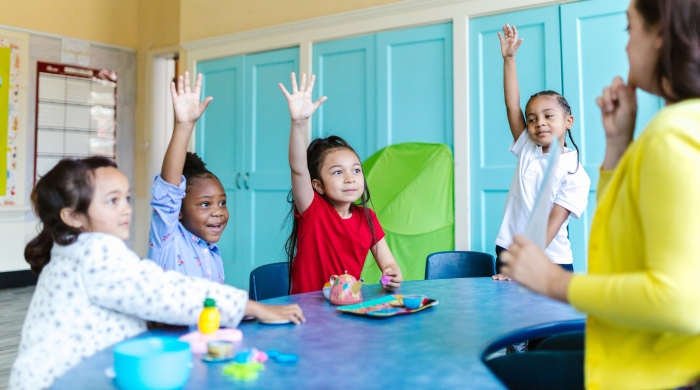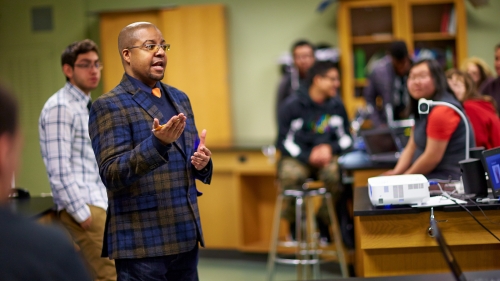Despite the challenges of distance learning during COVID-19, chemistry teacher Lorraine Zhong was determined to complete her YPAR project with her high school students.
Adapting to their newly-virtual world, together they launched a social media campaign to promote respect in the classroom.
YPAR – Youth Participatory Action Research – is a key feature of NYU Steinhardt’s Teacher Residency program. Through this student-driven process, teacher residents work with their students to identify a problem or project within the school community, research evidence-based solutions, and coordinate with school leadership to implement changes.
It’s all a part of the mission of the Teacher Residency, which seeks to develop the relationships between residents and their school communities and create meaningful change from the moment residents step on campus.
The year-long project is an experiment for residents and their students alike. Students learn qualitative research methods, project management, and creative problem-solving. Even more importantly, they learn that they have the power and the ability to advocate for themselves to teachers, school administrators, and beyond.
What we learned about was true allyship and advocacy and how to create space for others to have their voices heard. It’s essential to think about the ways that we can give students agency and actual steps to move into leadership positions.
“Throughout the journey, I witnessed my team members transition from being students who were hesitant to challenge the status quo to leaders who were motivated to create real change. The process opened my eyes to the depth of understanding students have about their own environments,” Zhong shared. “At the initial research phase, my team brought forth problems of practice that I and other teachers had previously been oblivious to. The social and emotional awareness that my students carried with them taught me how to be a better ally and leader.”
Zhong’s research, which included pre- and post-action data collection, revealed that the students’ social media campaign was successful in raising respect in the classroom.
For residents, YPAR is frequently a lesson in the potential passion and engagement of their students, and a first-hand look into what they consider most important. For her YPAR project, science teacher Joy Sanga initially wanted to explore gender differences in the classroom. However, she soon found that her students had their own ideas about the most important areas for change in their school.
“What they [saw and felt] is that schools give the most attention to the squeakiest wheels; the students who didn’t do the right thing get a lot of attention,” Sanga said. “The kids came up with the Shout-Out Squad. Our eighth graders would shout out other eighth graders who did good deeds or made an impact.”
Prioritizing student ideas is important not just for ensuring that they are enthusiastic participants in the project; it also empowers them to be agents of change in their community.
“What we learned about was true allyship and advocacy and how to create space for others to have their voices heard. It’s essential to think about the ways that we can give students agency and actual steps to move into leadership positions,” Sanga shared.
Since the launch of the Teacher Residency in 2016, YPAR projects have included the creation of a garden to provide fresh food to community members; the launch of a social media campaign to promote kindness and understanding; the implementation of a peer counseling system; and the reorganization of the schedule to provide students and teachers alike with more meaningful time to work and eat during the school day.
Related Articles
Breaking Barriers in Education
NYU Steinhardt’s Teacher Residency infuses diversity into schools through unique, year-long degree and experiential program.
NYU Steinhardt Ranks #4 Among Best Graduate Schools of Education
US News & World Report ranks NYU Steinhardt the #4 best graduate school of education in the nation.
Path Program Named in NYC DOE Chancellor's Plan to Improve Special Education Programs
DOE School’s Chancellor David Banks has pledged to make a $205 million dollar investment to expand several programs for students with disabilities, including autism, intensive sensory needs, and emotional disabilities. One of the valued programs that will be expanded is the “Path” program.




